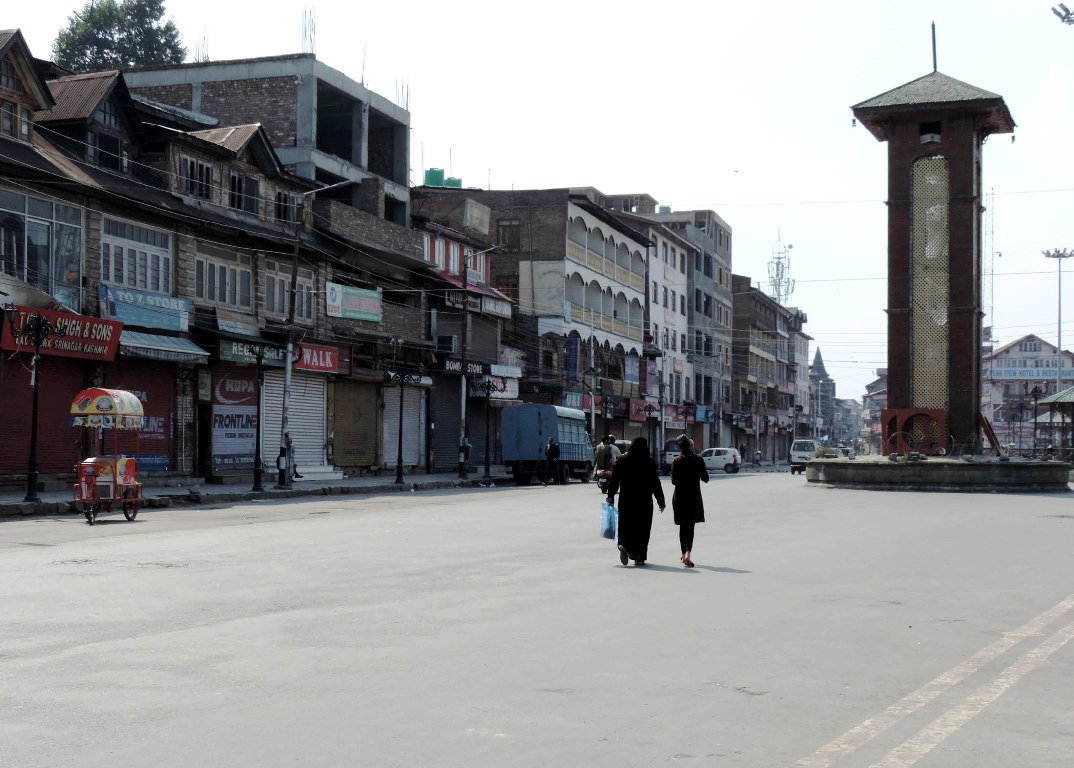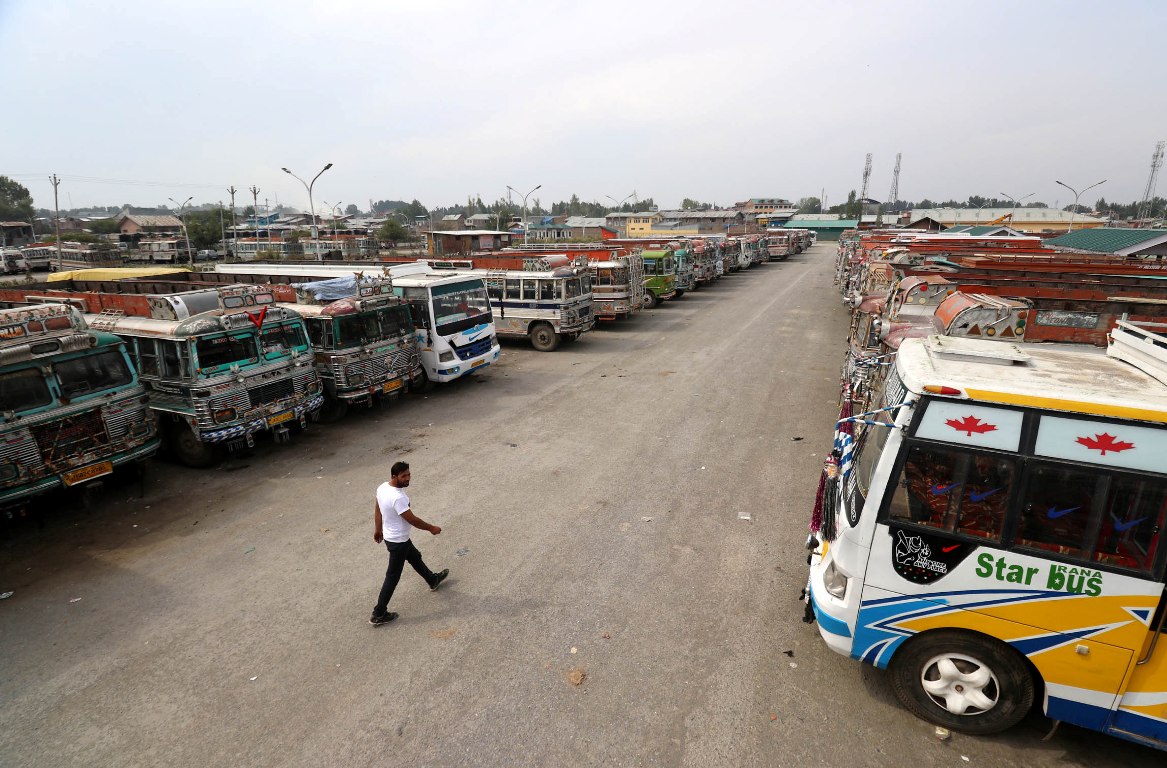by Tahir Bhat
SRINAGAR: With Kashmir getting into the third month of the crisis triggered by the August 5 decision of abrogation of special status and downgrading of the Jammu and Kashmir state, the region continues to reel under the communication clampdown. Barring parts of Srinagar city where the private transport is seen plying during peak official hours, the rest of Kashmir is calmly closed.

A deserted view of Lal Chowk as shutdown completes more than 2 months. KL Image: Bilal Bahadur
Some of the markets open for a few hours during early mornings and late evenings enabling the residents to manage their provision requirements. Public transport and schools continue to be closed. Most of the offices in the uptown Srinagar and the district headquarters operate.
The train that runs between Baramulla and Banihal continues to be frozen for more than nine weeks now. It had stopped operating in anticipation of the August 5, decision in wake of the advisories that the state government issued. Reports appearing in media said it is incurring a loss of Rs 3 lakh per day. Rail continues to be the cheapest mass transport available in Kashmir.
Commercial transporters are incurring huge losses for the last two months too.
On September 29, however, Home Minister Amit Shah said there were no “restrictions”. His deputy, G Kishan Reddy said a day later that Kashmir was moving back to normal. Authorities say they have restored all the fixed line telephones whose number is not even a fraction of more than six million mobile phones that operates in Kashmir till August 4, night. Jammu and Kashmir has more active cell phones than its population.

Schools and colleges still remained closed in Kashmir valley since August 5. KL Image: Bilal Bahadur
Officials said that a section of the cell-phones usually operated by its staff, mostly police and the civil administration, are operational. Most of them have internet connectivity as well. However, the facility stands closed to the commoners and the media. The media continues to operate from a 9-computer Media Facilitation Centre (MFC) that the government operates from a hotel on the Gupkar Road. Reporters operating from Srinagar had protested against the communication blockade early this week but there has not been any response, so far.
While the governor’s administration is busy preparing for the first Block Development Council (BDC) poll on October 24, days ahead of the reopening of the durbar move in Jammu, the political class continues to be in house arrest or in jail. Barring two political workers the entire flock continues to be in the special jail set up in the Centaur Lakeview Hotel on Srinagar’s boulevard.
However, the government set free a number of politicians in Jammu who were under house arrest for around two months. Once freed, NC leader Devinder Singh Rana presided over a meeting of his party workers in Jammu and sought permission to meet Dr Farooq Abdullah, and Omar Abdullah, the president and the vice president of National Conference. While Dr Abdullah is formally detained under Public Safety Act, Omar is in solitary confinement – albeit in preventive custody – in Hari Niwas Palace.

Public transport buses are parked inside Parimpora stand. KL Image: Bilal Bahadur
Farooq Khan, one of the adviser’s of governor told reporters in Jammu that the politicians will be freed gradually and one by one. Ram Madhav, a BJP leader who has been handling Kashmir for a long time, has also stated that the detained Kashmir politicians will be released one by one.
Authorities made two efforts in last nine weeks to reopen the schools. On both the occasions, the students did not come to schools even though a number of major schools in the city said they had ensured the staff attendance. Officials admit that the school teachers continue to reach their postings, unlike students. Most of the major schools have sent learning data to their students. Now the government is hoping that the colleges and the universities will resume routine from October 9.
Kashmir has 10,777 primary, middle and higher secondary government schools, of which, officials said, 10,442 were opened in phases to dismal attendance. The state administration now plans to start colleges and universities by 9 October.
Students preparing for professional courses or major examinations have suffered a lot because of the lack of communication. Some of them, who are enrolled with a few coaching centres, have actually migrated to Jammu for the time being.
The life in Kashmir periphery continues to be dull. In certain areas people have been able to harvest the apple but mostly it is still on the trees in Shopian, Pulwama and parts of Kulgam. If the apple picking does not pick up quickly, it can have serious impact on the economy of Kashmir that will last for more than a year. Kashmir produces more than two million tonnes of apple and it is an estimated Rs 10,000 crore economy with huge cascading impact. All the fruit mandis across Kashmir including the two key markets in Sopore and Shopian are locked.

Trains are suspended since August 5. KL Image: Bilal Bahadur
Hospitals said that the footfalls were abysmal initially but have started improving as the private transport is able to run early mornings and late evenings.
Officials say they are hopeful that situation will bounce back to normalcy soon. However, most of the Srinagar city continues to live under a mix of civil curfew and restrictions. The opening of Jamia Masjid is considered to be the absolute parameter of normalcy. But it has not seen any Friday gathering for the nine weeks in row.
from Kashmir Life https://ift.tt/30MPlfz
via IFTTThttps://kashmirlife.net
No comments:
Post a Comment